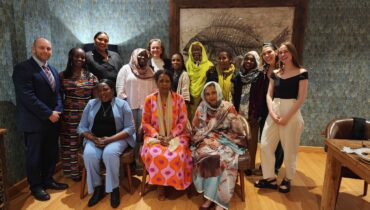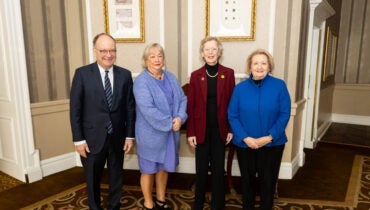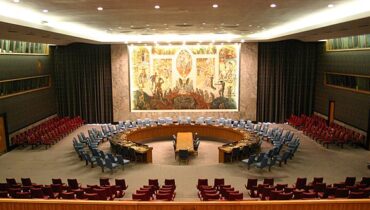Within the last few months, the complicated geography of justice across the continent of Africa has become even more confusing. Strides were made for accountability with the creation of the Special Criminal Court for Central African Republic and the opening of the trial of former Chadian President Hissène Habré at the Extraordinary African Chamber. However, international prosecution faced a setback with the escape of Sudanese President Omar al-Bashir from the African Union (AU) summit in South Africa in June. In all three of these cases, women have been victims, but they are also critical to rebuilding communities in Central African Republic, Chad and Sudan.
While Africa is the home to many innovations in justice (one of the first international tribunals focused on Rwanda, hybrid courts such as the Special Court for Sierra Leone, and many restorative methods such a mato oput in northern Uganda), many remain deeply skeptical of prosecution, especially when pressured by the international community. African leaders may feel threatened by the international justice regime, and Kenya’s backlash against the International Criminal Court is notable.
A legitimate debate remains regarding why African leaders often seem to be the subjects of international adjudication, while leaders in other regions do not face the same types of scrutiny. The fact that the “justice cascade” – the term Kathryn Sikkink coined for the effect trials would have in securing respect for human rights about the world – has largely been confined to Africa has led many to see the effort as a neo-colonial attempt to control the continent, and African states often receive the most pressure and scrutiny from the international justice community. However, in seeking new and better ways to serve justice, African states are also leaders of innovation in international justice, and can have a significant impact on the precedents and path of international criminal justice and reconciliation efforts. The current developments in criminal justice across Africa demonstrate the intersection of international, national, and regional authorities in where and how justice in enacted.
As women become more vocal and more visible in international peacebuilding, development and security, they have become better equipped to be involved formally in justice processes and informally as civil society leaders. Women form the foundation of peacebuilding and reconciliation efforts, and their work is vital for rebuilding broken communities. Justice is a women’s issue, and women’s needs must be taken into consideration at every step of the process.
The Special Criminal Court for Central African Republic
On June 3, interim President Catherine Samba-Panza of Central African Republic (CAR) put forth a law creating a Special Criminal Court (SCC) to investigate and prosecute grave human rights violations committed in the country since 2003, the year of a coup against elected president Ange-Félix Patassé. This marks the first time in the world that a government has created, through national law, a hybrid court where national and international judges and prosecutors will work together. Other hybrid courts – such as the Special Court for Sierra Leone, the Extraordinary Chambers in the Courts of Cambodia, the War Crimes Chamber of the Court of Bosnia and Herzegovina, and Senegal’s Extraordinary Chambers for trying Habré – have had mixed success as they try to address the problems that plagued the international criminal tribunals for the former Yugoslavia and Rwanda.
The SCC will have responsibility for investigating grave human rights violations, including widespread sexual violence. Between January and December 2014, 2,527 cases of conflict-related sexual violence were documented, including rape perpetrated to terrorize civilians. The Office of the Special Representative of the Secretary-General for Sexual Violence in Conflict reports that women and girls have been systematically targeted. This sexual violence has been perpetrated by all sides and is used to subjugate and humiliate opponents. Sexual violence was taken into account in the cessation of hostilities agreement negotiated in July 2014 in Brazzaville, and has been identified as a violation to be monitored in the implementation of the agreement.
The Trial of Hissène Habré
Former Chadian President Hissène Habré is standing trial before the Extraordinary African Chambers (EAC), a new regional body. The trial began on July 20, though it has been suspended until September 7, since Habré’s representation refused to cooperate with the proceedings. Habré is accused of crimes against humanity, war crimes and torture regarding the deaths of an alleged 40,000 people during his rule between 1982 and 1990. Thierry Cruvellier of the New York Times has described the trial as “the event of the year in the field of international criminal law,” largely because of the interesting international and regional dynamics of the trial. Habré’s trial will be the first in which the courts of one country prosecute the former ruler of another for alleged human rights violations, as well as the first universal jurisdiction case to proceed to trial in Africa. The trial has the potential to create powerful precedent for future prosecutions.
The chambers were inaugurated by Senegal and the African Union in February 2013 to prosecute the “person or persons” most responsible for international crimes committed in Chad during Habré’s administration between 1982 and 1990. Burkinabe and Senegalese judges will hear the case, which came to trial through Belgium’s universal jurisdiction law, which allows Belgian national courts to prosecute serious crimes even when committed abroad and against foreign victims – a powerful and sometimes controversial legal tool.
Habré was ousted from power by current President Idriss Déby in 1990, and Habré fled to Senegal, where he stayed without issue until 2005, when a Belgian judge issued a warrant for his arrest and Senegal placed Habré under house arrest. In 2006, the AU said that Senegal should try Habré on behalf of Africa, and in 2008, the Senegalese constitution was amended to allow for the prosecution of war crimes. Senegal planned to repatriate Habré in 2011 to Chad, where he was sentenced to death, but the UN blocked this action. In 2012, the International Court of Justice demanded that Senegal try Habré or turn him over to Belgium. In 2013, the AU and Senegal established the EAC.
The EAC is an attempt for Africans to try Africans, and the international community has great hope that this new institution will administer justice swiftly and fairly. While the continent is mired between being a leader and a victim of international justice, this new court could provide a middle path, if it is effective.
Women in Chad experience serious restrictions on their personal and civil liberties. A high prevalence of domestic violence, female genital mutilation and early marriage leave women with little access to public space, financial services, land assets or political participation. When a group of women organized a march in 2009 to condemn widespread impunity for sexual violence, they faced death threats for their willingness to speak up for their rights.
A single trial is not the cure for the violence and restrictions that Chadian women face, and the Déby administration should also be held responsible for widespread sexual and gender-based violence. However, the trial of Habré will create a precedent that sovereign immunity is no longer acceptable, that victims and survivors must be heard, and that justice, even if delayed, can be enacted against even the most powerful.
Bashir Fled from AU Summit
In June, the African Union (AU) held a summit in South Africa, where discussions centered on women’s empowerment and governmental responsibility. Sudanese President Omar al-Bashir attended, even though the International Criminal Court (ICC) released a warrant for his arrest. Bashir is accused of perpetrating genocide, crimes against humanity, and war crimes against the Fur, Masalit, and Zaghawa peoples. His trial would mark first time trying rape-as-genocide for the ICC, a major step toward ending impunity for sexual violence. Trials in the international criminal tribunals for the former Yugoslavia and Rwanda offer guidance, although many of those victims were killed, whereas many Sudanese victims are still alive and are hoping for justice to be served.
On June 14, a provisional court order was issued preventing Bashir from leaving the country until it could be decided whether or not to arrest him. However, the South African government disregarded this order and, on June 15, Bashir left South Africa for Sudan. South Africa had to choose between the AU and the ICC, and it chose to protect sovereign immunity.
While Africa is the birthplace of innovative new justice initiatives, the continent remains highly skeptical of the international criminal justice regime, and perhaps with good reason. While the SCC and the trial of Habré are significant steps toward ending impunity, justice for women and men cannot be achieved without the buy-in of regional hegemons like South Africa.
Formal courts are not the solution for all that ails Africa; they cannot accomplish the hard work of reconciliation and community-building. Prosecution is simply one tool in the broader peacebuilding and development effort required to create stronger, more resilient communities. Women have been victims of sexual violence, torture, murder and ethnic cleansing in these cases across the continent, and they deserve justice that is efficient, effective and fair. However, women are also powerful actors for reconstruction and reconciliation; they are the foundations of communities, but they must be able to work within an atmosphere that is secure and in which women and their needs are treated with respect. Trials in courts such as the EAC and SCC are the first step to creating that secure environment.


